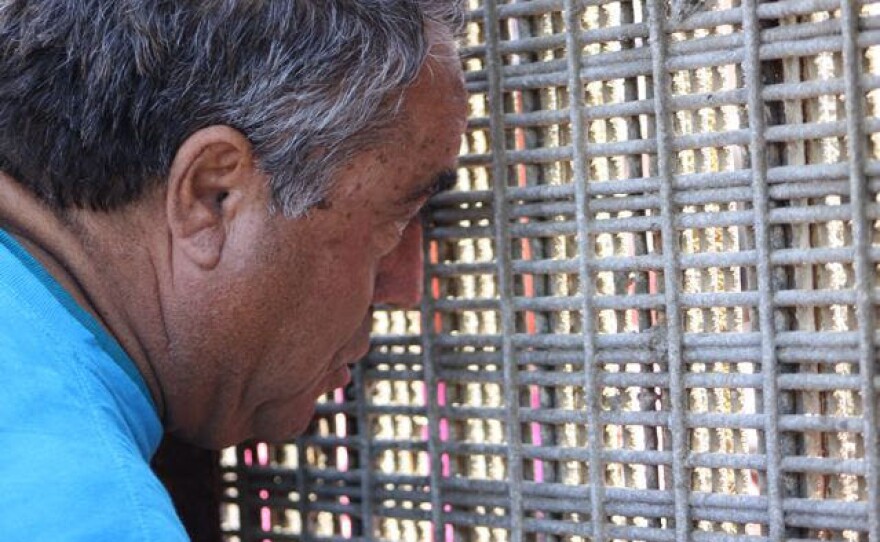Bending The Border
It happens once a month — a meeting between hope and desperation for Mexican deportees.
At the edge of the ocean in the southwest corner of the United States, where the boundaries between the U.S. and Mexico meet, stands Friendship Park. Everyone waits their turn behind a fence that trails into the beach, dividing both countries.
On the U.S. side, American attorneys stand against the fence listening and giving free legal advice; behind them are white border patrol trucks. On the Mexico side, deportees wait for answers.
Here, you'll likely find Enrique Morones. He's the founder and director of Border Angels, a nonprofit known for its work on behalf of people living in the U.S. illegally. Morones is a proclaimed guardian of the border and the mastermind behind the free legal consultations.
These consultations are just one of dozens of his ideas.
Years ago, Morones convinced the U.S. Border Patrol to do something they hadn't since 2009: open the park door to allow people from both sides of the border to meet — unobstructed.
Jump to video: Enrique talks Border Angel origins
“All of a sudden the doors were open, and this young girl jumps into the arms of her father. It was the first time ever in their lives they were able to hug each other. And no one could believe it.”
Morones also helps organize an annual immigration march, called “Marcha Migrante.” Morones leads a caravan of marchers and volunteers traveling hundreds of miles, sometimes through different states, aiming to draw attention to immigrant struggles.
“You never know which event is going to be the one to get someone with power involved or be the one to get someone to change a law.”

To some he’s known for his work helping deported immigrants at Friendship Park or for the cultural programming there. To others he’s known for driving out to the desert to drop off water for anyone who might be walking through. He said in the beginning he was just dropping off donated clothes as part of his Catholic upbringing. He said it was just what he grew up doing.
But in 1986, a woman named Yolanda told him to go to the canyons in Carlsbad. That’s where Border Angels got started.
The organization’s name came from Don Francisco, a host of a top rated Spanish television show on the Univision network. When he introduced Morones, Don Francisco called him, “El angel de la frontera" — "angel of the border" in Spanish.
A regular on national news shows, Morones is never afraid to speak up. Some say his advocacy on behalf of immigrants makes him controversial, but Morones quickly responds: “It’s like Martin Luther King says, 'if you remain silent, you’re part of the problem.' And I’m not a person who’s going to remain silent.”
The Homeless House Of Mexico

In 1995 Morones was walking through Balboa Park.
Hoping to organize an event for Mexico’s Independence Day, he found — and couldn’t believe — there was no House of Mexico among the park's international cottages.
“I thought there’s something wrong with the fact we have to do a celebration for Mexico in the House of Sweden.”
He put the word out to let friends and other community leaders know. Then in 2002, after putting together the paperwork to form a House of Mexico nonprofit, he was told there was no room. In 2004, the nonprofit gained membership to the House of Pacific Relations International Cottages.
And 20 years after his realization, there is still no permanent home for House of Mexico.
In January, the San Diego Planning Commission approved a plan to add nine more cottages at the park.
As Balboa Parks celebrates its centennial, Morones is still hopeful that one day there will be a physical space at the park to share Mexico’s culture.
The First Dual Citizen

In 2009, former Mexican President Felipe Calderón honored Morones with Mexico’s national human rights award. And in 1998, former Mexican President Ernesto Zedillo shook his hand for becoming the first person to become a citizen of both the U.S. and Mexico.
Morones said a lot of his inspiration comes from his father, his personal hero, who taught him values to help others and respect for his culture.
“I think it’s important that we all practice what we preach. Leadership by example, I think that’s what its all about — by going out there and showing what you think should be done, instead of just talking about it. And I try and live that everyday.”





